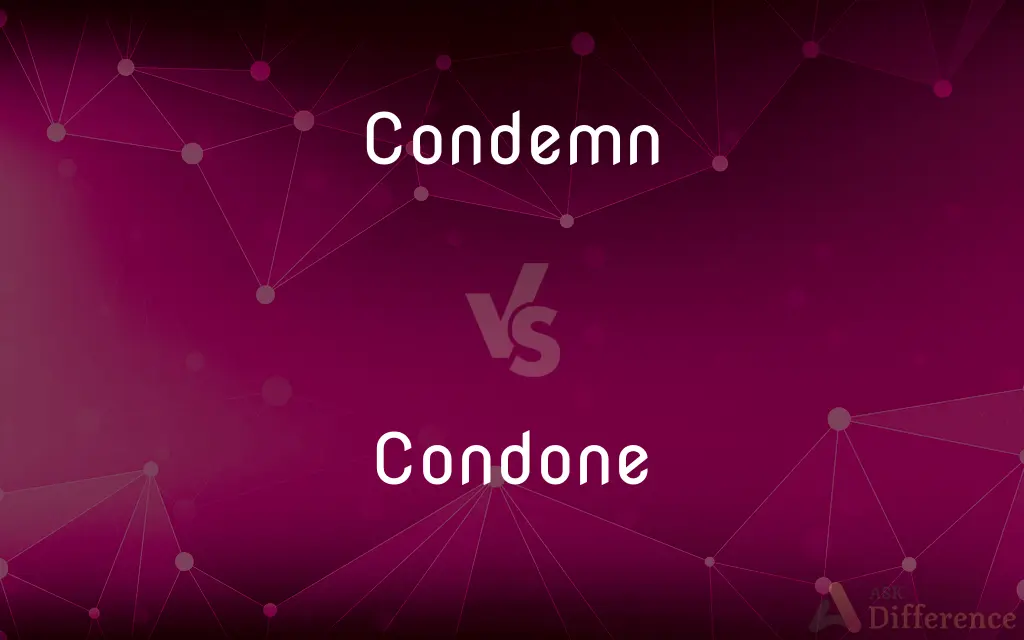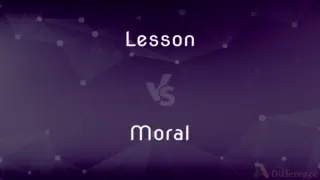Condemn vs. Condone — What's the Difference?
By Tayyaba Rehman & Fiza Rafique — Updated on March 14, 2024
Condemning involves expressing strong disapproval or sentencing to a punishment, emphasizing disapproval, while condoning means overlooking or allowing behavior, often with implied approval or forgiveness.

Difference Between Condemn and Condone
Table of Contents
ADVERTISEMENT
Key Differences
Condemn is a term used to express complete disapproval of actions, beliefs, or statements, often associated with a sense of moral outrage or legal judgment. For example, a government might condemn acts of terrorism, indicating both disapproval and a stance against such actions. On the other hand, condone implies a willingness to overlook faults or wrongdoings, sometimes suggesting tacit approval or at least a refusal to criticize or punish. If someone condones a behavior, they essentially allow it to occur without reprimand, which can be seen in social or legal contexts where certain actions, though not endorsed, are not actively opposed.
In legal contexts, to condemn can also mean to officially declare a building unsafe or to sentence someone to a particular punishment, showcasing a form of authoritative judgment. Condone, in contrast, does not carry legal weight but reflects an attitude or decision to ignore or accept behavior that is considered wrong by some standards. This distinction is crucial in discussions about ethics and law, where the implications of condemning versus condoning actions can significantly affect societal norms and legal practices.
Condemnation often comes with the expectation of a response or correction, implying that the condemned action or behavior should be changed or penalized. Condoning, however, might lead to a continuation or increase of the behavior in question because it is met with passive acceptance or is implicitly approved. This dynamic is evident in debates over public policies, personal relationships, and international relations, where the line between condemning and condoning can shape outcomes and perceptions.
The choice between condemn and condone thus reflects a fundamental stance on accountability and moral judgment. While condemning aims to highlight and discourage unacceptable behavior, condoning suggests a level of acceptance or willingness to overlook faults, each carrying significant implications for social cohesion, legal integrity, and individual relationships.
Comparison Chart
Definition
Express disapproval or sentence to punishment
Overlook or allow behavior without punishment
ADVERTISEMENT
Implication
Disapproval, moral outrage, or legal judgment
Implied approval, forgiveness, or refusal to criticize
Context
Legal judgments, moral stances
Social tolerance, ethical considerations
Expectation
Correction or penalization of behavior
Possible continuation or increase of behavior
Impact
Discourages unacceptable behavior
May encourage behavior by implying acceptance
Compare with Definitions
Condemn
Denounce something as wrong or evil.
Activists condemned the law as discriminatory.
Condone
Accept and allow morally questionable behavior.
Society often condones certain behaviors while condemning others.
Condemn
To express strong disapproval of actions or beliefs.
The international community condemned the country for human rights abuses.
Condone
To overlook or allow behavior that is considered wrong.
The school cannot condone cheating during exams.
Condemn
Sentence someone to a particular punishment.
The court condemned the criminal to ten years in prison.
Condone
Imply approval of actions by failing to criticize or punish.
By ignoring the misconduct, the company seemed to condone it.
Condemn
Show complete disapproval through actions or statements.
The leader's speech condemned the recent acts of violence.
Condone
Forgive or disregard an offense without punishment.
The manager condoned the employee's mistake, recognizing it as a one-time error.
Condemn
Officially declare something to be unfit for use.
The old building was condemned after failing the safety inspection.
Condone
Make allowances for undesirable behavior.
Parents sometimes condone their children's bad behavior to avoid conflict.
Condemn
Express complete disapproval of; censure
The plan was condemned by campaigners
Most leaders roundly condemned the attack
Condone
To overlook, forgive, or disregard (an offense) without protest or censure.
Condemn
To express strong disapproval of
Condemned the needless waste of food.
Condone
Accept (behaviour that is considered morally wrong or offensive)
The college cannot condone any behaviour that involves illicit drugs
Condemn
To pronounce judgment against; sentence
Condemned the felons to prison.
Condone
(transitive) To forgive, excuse or overlook (something that is considered morally wrong, offensive, or generally disliked).
Condemn
To judge or declare to be unfit for use or consumption, usually by official order
Condemn an old building.
Condone
(transitive) To allow, accept or permit (something that is considered morally wrong, offensive, or generally disliked).
Condemn
To force (someone) to experience, endure, or do something
"Those who cannot remember the past are condemned to repeat it" (George Santayana).
Condone
To forgive (marital infidelity or other marital offense).
Condemn
To lend credence to or provide evidence for an adverse judgment against
Were condemned by their actions.
Condone
To pardon; to forgive.
A fraud which he had either concocted or condoned.
It would have been magnanimous in the men then in power to have overlooked all these things, and, condoning the politics, to have rewarded the poetry of Burns.
Condemn
(Law) To appropriate (property) for public use.
Condone
To pardon; to overlook the offense of; esp., to forgive for a violation of the marriage law; - said of either the husband or the wife.
Condemn
(transitive) To strongly criticise or denounce; to excoriate the perpetrators of.
The president condemned the terrorists.
Condone
Excuse, overlook, or make allowances for; be lenient with;
Excuse someone's behavior
She condoned her husband's occasional infidelities
Condemn
(transitive) To judicially pronounce (someone) guilty.
Condemn
(transitive) To confer eternal divine punishment upon.
Condemn
(transitive) To adjudge (a building) as being unfit for habitation.
The house was condemned after it was badly damaged by fire.
Condemn
(transitive) To adjudge (building or construction work) as of unsatisfactory quality, requiring the work to be redone.
Condemn
(transitive) To adjudge (food or drink) as being unfit for human consumption.
Condemn
To declare something to be unfit for use, or further use.
Condemn
(transitive) To determine and declare (property) to be assigned to public use. See eminent domain.
Condemn
To declare (a vessel) to be forfeited to the government, to be a prize, or to be unfit for service.
Condemn
To pronounce to be wrong; to disapprove of; to censure.
Condemn the fault, and not the actor of it!Why, every fault's condemned ere it be done.
Wilt thou condemn him that is most just?
Condemn
To declare the guilt of; to make manifest the faults or unworthiness of; to convict of guilt.
The queen of the south shall rise up in the judgment with this generation, and shall condemn it.
Condemn
To amerce or fine; - with in before the penalty.
The king of Egypt . . . condemned the land in a hundred talents of silver.
Condemn
To adjudge or pronounce to be unfit for use or service; to adjudge or pronounce to be forfeited; as, the ship and her cargo were condemned.
Condemn
To doom to be taken for public use, under the right of eminent domain.
Condemn
Express strong disapproval of;
We condemn the racism in South Africa
These ideas were reprobated
Condemn
Declare or judge unfit;
The building was condemned by the inspector
Condemn
Compel or force into a particular state or activity;
His devotion to his sick wife condemned him to a lonely existence
Condemn
Demonstrate the guilt of (someone);
Her strange behavior condemned her
Condemn
Pronounce a sentence on (somebody) in a court of law;
He was condemned to ten years in prison
Common Curiosities
Can an action be both condemned and condoned?
While an action might be condemned by some and condoned by others, the two attitudes are fundamentally opposed and cannot be held simultaneously by the same entity toward the same action.
How is condoning different from endorsing?
Condoning involves a passive acceptance or willingness to overlook faults, whereas endorsing implies active support or approval.
What does it mean to condemn someone or something?
To condemn means to express strong disapproval or to officially declare that someone or something is reprehensible, wrong, or unfit.
Why is it important to understand the difference between condemn and condone?
Understanding the difference is crucial for navigating ethical dilemmas, legal judgments, and social norms, as it affects how actions and behaviors are perceived and addressed.
What role does public opinion play in condemning or condoning behaviors?
Public opinion significantly influences which behaviors are condemned or condoned, affecting legal decisions, policy-making, and social attitudes.
How do societies decide what to condemn or condone?
Societies decide based on a mix of ethical standards, legal principles, cultural values, and social norms, which can evolve over time.
Can an organization condone actions implicitly?
Yes, organizations can implicitly condone actions by failing to address or punish them, sending a message that the behavior is acceptable.
Why might someone choose to condemn a widely condoned action?
Someone might condemn a widely condoned action out of a sense of moral obligation, ethical stance, or to challenge prevailing norms and provoke change.
Can condoning behavior lead to legal changes?
Yes, widespread condonation of behavior can lead to legal changes, as laws may evolve to reflect societal norms and values.
How do personal beliefs affect what individuals condemn or condone?
Personal beliefs shape moral judgments, influencing what individuals see as right or wrong and thus what they condemn or condone.
Can legal systems condone actions that society condemns?
Yes, legal systems can condone actions through lack of legislation or enforcement, even if society morally condemns those actions, highlighting potential discrepancies between law and societal values.
Is it possible to condone something without being aware of it?
Yes, implicit condonation can occur through inaction or silence, which might unintentionally allow or overlook undesirable behaviors.
What are the consequences of condemning someone unjustly?
Unjust condemnation can lead to social ostracization, legal repercussions, and harm to the individual's reputation, underscoring the need for careful judgment.
What impact does condemning or condoning behavior have on society?
The collective actions of condemning or condoning behavior shape societal norms, influence laws, and guide public morality, affecting the social fabric and individual behavior.
How do international relations reflect practices of condemning or condoning?
International relations reflect these practices through diplomatic stances, sanctions, or support, often based on human rights, security, or ethical considerations.
Share Your Discovery

Previous Comparison
Individual vs. Particular
Next Comparison
Lesson vs. MoralAuthor Spotlight
Written by
Tayyaba RehmanTayyaba Rehman is a distinguished writer, currently serving as a primary contributor to askdifference.com. As a researcher in semantics and etymology, Tayyaba's passion for the complexity of languages and their distinctions has found a perfect home on the platform. Tayyaba delves into the intricacies of language, distinguishing between commonly confused words and phrases, thereby providing clarity for readers worldwide.
Co-written by
Fiza RafiqueFiza Rafique is a skilled content writer at AskDifference.com, where she meticulously refines and enhances written pieces. Drawing from her vast editorial expertise, Fiza ensures clarity, accuracy, and precision in every article. Passionate about language, she continually seeks to elevate the quality of content for readers worldwide.















































